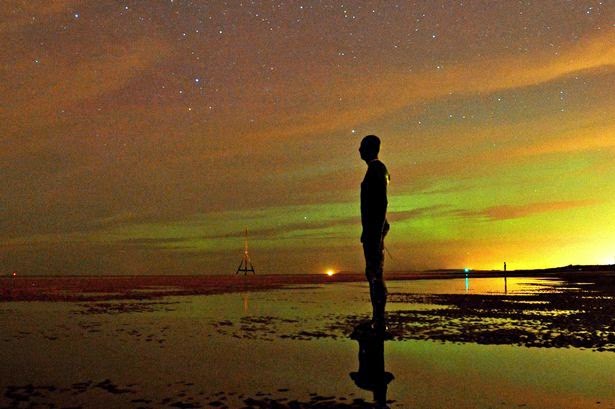Staring into the Abyss on Crosby Beach
In the last couple of months before leaving
Cheshire, there were a lot of goodbyes. In people’s homes, in coffee shops, in
two universities and in church there were more goodbyes to be made than I’d
realised. Whilst living in Crewe, it turned out I knew a lot of really nice
people. By the time I’d done my round of goodbyes I was heartily wishing I’d
done more helloing over the past few years. ‘Helloing’ isn’t a verb, of course,
but in future I hope to get better at it anyway. It’s not a good state of
affairs when you find yourself saying, ‘It’s a shame we haven’t seen each other
in a couple of years but I thought I’d pop in to say goodbye.’ That’s like
waking the sleeping patient to give them sleeping pills. Wake up! It’s time to
go to sleep! Surely that is not what friendship is about.
As an escape from the trauma of packing and
trying to sell a very reasonably priced and luxurious house (see Rightmove for
further details), Tracey and I took a drive to Liverpool and ended up on Crosby
Beach, home to Antony Gormley’s ‘Another Place.’ This art installation consists
of 100 cast-iron male figures stretched over a long stretch of beach. The
figures are meant to be some kind of reflection on the relationship between
humanity and nature. As time passes the wind, rain and sea are changing the
appearance of the statues as, no doubt, would be the case with any of us who
chose to stand naked on a Liverpool beach for a few years.
These middle-aged metal men are spread
fairly evenly apart and whilst they are identifiably a group each has a
solitary presence; each seems disconnected from the rest, unaware of others
facing the same sea salt plight. I thought of the filmmaker Werner Herzog, who
is always talking about staring into the abyss and I wondered if this was what
these statues were doing. Standing on Crosby Beach, staring into the abyss or
at least towards Birkenhead.
The scene was made particularly eerie by
the fact that even as I joined them in their dispassionate stare into the
abyss, some of the figures were gradually becoming submerged by the approaching
tide. Most maintained their dignity whilst the waters consumed them but one had
a seagull perched on his head. Anyone who has lived a life knows that keeping
your dignity with a seagull on your head is a big ask.
I liked the Antony Gormley figures, but I
wanted them to be freed from their isolation, to recognise their metallurgical
mates, to abandon staring into the abyss in favour of discovering the meaning
in each other. Others clearly are moved in a similar direction. Do a web search
for images of these figures and many feature some kind of interaction between
statue and human visitor. On a daily basis, these metal men are distracted from
staring into the abyss by generous hugs, people dressing them in silly hats,
trunks and other paraphernalia, silly jokes and kids digging holes around them
– ‘Stop digging, he’ll fall over.’ Perhaps instead of staring into what cannot
really be seen somewhere slightly out of view on the far horizon, it’s time for
these figures to look around, to see and value what’s close to them right now.
Maybe that’s true for all of us.
Picture by Gavin Edwards


Comments
Post a Comment